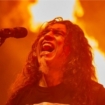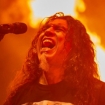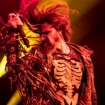Lizzy Borden may not have made it as big as Mötley Crüe, Quiet Riot or Ratt, but the L.A. glam-metal/shock-rock outfit — which has been chugging along since 1983 — experienced all of the decadence and debauchery the Hollywood had to offer. In the beginning, however, they played for seated crowds at a dinner club called The Troubadour.
"A lot of the heavy-metal stuff started there, and there were tables and chairs so people would sit down and have dinner while they watched you because the place was originally set up for folk music," says frontman Lizzy Borden, who's celebrating his 35th year in the band with the release of his eighth studio full-length My Midnight Things. "We were out there blasting metal and throwing blood on everybody and people were sitting there eating their food."
Eventually, the club realized they needed to remove the tables and chairs and present concerts in an open room. By that time, they had lost most of their regulars and had to rebuild their clientele.
"Sometimes we'd play for three people because there really was no scene yet," Borden recalls. "Our scene really started when all the high school kids found out about us and they started flocking to Hollywood to places they would never go. That's what created that whole thing. Then all these musicians flocked to Hollywood to become stars and they brought in more people and what it built into was amazing. But what it started out as was bleak. There was no thought there was going to be a big scene there — not in a million years."
Once the Sunset Strip scene exploded, Lizzy Borden were praised both for their anthemic songs and theatrical horror-themed shows. Borden brandished an axe onstage and traveled with a decapitated mannequin head. (Alice Cooper was on hiatus at the time.) The band signed with Metal Blade Records and released their first EP, Give 'Em the Axe, in 1984. In the decades that followed, Borden made their mark on the Billboard charts, were featured in the 1988 Penelope Spheeris documentary The Decline of Western Civilization Part II: The Metal Years and enjoyed strong radio play in select markets.
There were also setbacks and tragedies, though. Lizzy Borden didn't get much play on MTV, and their frontman watched his star guitarists bail for bigger groups and suffered the deaths of two bandmates/friends. After his 2007 guest-star-filled album, Appointment With Death failed to make a mark, he stopped writing and toured the world for more than five years.
Now, Lizzy Borden have returned with a revamped sound. My Midnight Things downplays the six-string histrionics of Appointment With Death for solid hard-rock songwriting. "I didn't depend on heavy-metal guitar to write this album," the singer says. "Every time I got to the point where there was a metal guitar riff it was like, 'OK, back off that. Let's write this another way.' That was a challenge because I had always written or played on my album with, you know, 'chunka-chunka.' I purposely did not want that in there. I wanted the songs to stand up on their own."
In the candid interview below, Borden talks about the golden years of the L.A. hair-metal scene, why he was almost arrested for murder at a German airport, the deaths of bandmates and what made him decide to return to the scene after a lengthy break.
YOU WERE IN L.A. WHEN COMMERCIAL METAL WAS IN FULL FORCE. WAS IT ALL ONE BIG PARTY FOR LIZZY BORDEN BACK THEN?
When it was in full gear in the mid-Eighties and we were selling out everywhere, it was a seven-day-a-week party. We would go to rehearsal, and after rehearsal, we'd go to Hollywood and tell people about our show or go see another show. And after that, we'd all go to the Rainbow and go crazy there. Then, we'd go to somebody's mansion in the Hollywood Hills and do crazy things. That happened every day. It was a lifestyle. It was such a crazy lifestyle, but it was normal. It's just how we lived.
WHAT'S YOUR FAVORITE TALE OF DESTRUCTION?
We signed our record deal for Deal With the Devil in a hotel room in 1999. There were all these girls there and there was a wild party. Basically, we destroyed the whole place. Of course, I had already been on tour for years and I knew that whatever you break you gotta pay for. So as it was happening, half of me is going, "No, no, no!" And the other half of me is going, "Oh yeah!" I've never seen such destruction. There wasn't anything in there that was usable again by the time it was over.
DID THE FUN OFTEN END ONLY WHEN THE POLICE SHOWED UP?
Oh man, in the early days we would get raided by the vice squad all the time. If we played outside of Hollywood, chances are our show was going to get raided because they thought we were corrupting their children. They would stop us right in the middle of the show and turn on all the lights and get the kids out to shield them from us.
WHAT'S YOUR MOST MEMORABLE RUN IN WITH AUTHORITIES?
We were playing the Bang Your Head Festival in Germany in 1999 and it was a particularly bloody show. I packed up my bag right afterward and we went straight to the airport. Well, they wouldn't let me check my bag. They made me bring it on the plane. When I was going through the x-ray machine, the woman took the bag and opened it. Then she reached her hand in and it came out all bloody. She started screaming and in about two seconds, 30 cops were surrounding me. They drove me through the whole airport and stuck me in a room and kept asking me, "What have you done? What have you done?" I told them I was a performer and I had just played a festival and they didn't believe me. They thought I had just killed somebody. They finally realized I was telling the truth and let me go. But I had to promise the guy asking me questions that I would never to come back to Germany. I promised, and we went back the next year.
HOW DID YOU KEEP YOURSELF FROM BECOMING ANOTHER ROCK & ROLL CASUALTY?
I had such ambition that even at the peak of our success in Hollywood in '85, I decided I didn't want to be a local band, I wanted to tour the world. So I left Hollywood to tour. When we did that first tour, I was singing in such a high range and I had to do it every night without sleep. I figured out the only way I could keep doing that was to not drink hard alcohol or take drugs. That's what saved me from going ape-shit crazy like a lot of people did, including people in my band.
YOU EXPERIENCED COMMERCIAL SUCCESS, BUT NEVER REACHED A PLATINUM LEVEL OF STARDOM. DID YOU FEEL RIPPED OFF?
Well, I didn't like it, but I understood it. I was on a small independent label that didn't believe in throwing millions of dollars into marketing. Their whole thing was word of mouth. My competition was Bon Jovi and Mötley Crüe. I had hundreds of dollars in marketing and they had millions. It was frustrating. I'd see radio charts and I'd be getting played all across the country, but all I could see was these big bands playing all the arenas and I was right on the radio next to them.
YOU'VE PLAYED WITH MANY GREAT GUITARISTS INCLUDING JOE HOLMES, DAVID MICHAEL PHILIPS, IRA BLACK AND DARIO LORINA.
Back in the Eighties, every guitar player was a gunslinger and they were always looking for a better opportunity. They would come into your band and then they would look to jump ship to something better. But I was never jealous of them. In fact, when Dario told me he had this opportunity with Black Label Society I made him do it.
WHY DID 11 YEARS PASS BETWEEN APPOINTMENT WITH DEATH AND MY MIDNIGHT THINGS?
The collapse of the music industry that made me stop. There was a structure to the way things were in the Eighties and Nineties with publicists and promotions departments and marketing people working together, and it was all built on money. When the industry collapsed it made no sense to keep going with that format. When our last record was released, it was just thrown out there with no support and it did nothing. I went, "OK, this is the new system? No thank you." But now Metal Blade has changed the game a little bit. It's largely about social media, but it's also about the different tentacles that they have that connect to online magazines, real magazines, video producers that promote the music in every way possible to get it out there. And that's what I like.
HOW DID YOU WANT MIDNIGHT THINGS TO BE DIFFERENT THAN APPOINTMENT WITH DEATH?
With the exception of "Under Your Skin," I wanted to go back to the way I was thinking when I wrote 1987's Visual Lies and 1989's Master of Disguise. Back then, I was really thinking about songs. I wasn't trying to write heavy-metal songs, specifically. On Appointment With Death, we had [Dokken's] George Lynch and [Y&T's Dave] Meniketti and all these great guitar players on the record. I started to feel like I was writing these songs just to showcase musicians and I thought that was cheapening my songs. So I paid extra attention to how the new songs were written and tried not to make any one element the centerpiece.
YOU'VE HAD A PRETTY STEADY CAREER FOR 35 YEARS, BUT YOU TOOK A TWO-YEAR HIATUS IN 2004 AFTER GUITARIST ALEX NELSON DIED.
I didn't want to continue on like he didn't exist. We ended up creating a band called Starwood, which was just a rock band we did for fun. We didn't tour, we just made the record. But when one of those kinds of things happens it's really shocking.
ALEX DIED IN A THREE-CAR ACCIDENT. WHERE WERE YOU WERE WHEN YOU FOUND OUT?
He had met this girl, who was a friend of ours and married her on a whim. He always did things like that. And two seconds later, he called and told me he was moving to Palm Springs. He was there for a while and we were supposed to come and visit him in his new house. And then I got the call. I was in the studio at the time I got the call and it was the last thing I expected. It just knocks you for a loop and that feeling never goes away. The second that you hear the news, it's tattooed in your brain.
GUITARIST COREY JAMES WAS THE SECOND LIZZY BORDEN ALUMNUS WHO DIED.
Corey James was on the Master of Disguise tour [in 1989] and he passed [in 2009] in a car crash and he was driving the same make vehicle that Alex was driving, which is really crazy. One of the songs I wrote on this album, "Long May They Haunt Us," is partially about them. There are people who have been in your life and when you wake up in the morning, they just haunt you. That happens with Corey and Alex all the time, but that's the kind of haunt you don't want to go away.
DO YOU FEEL LIKE THERE'S A POSITIVE MESSAGE TO MIDNIGHT THINGS?
These songs address the darker side of love, really, but I did want to have a positive aspect to it. I wanted that belief that it was going to be all right. It's an oncoming train, but you don't see the train — you see the light at the end of the tunnel.












